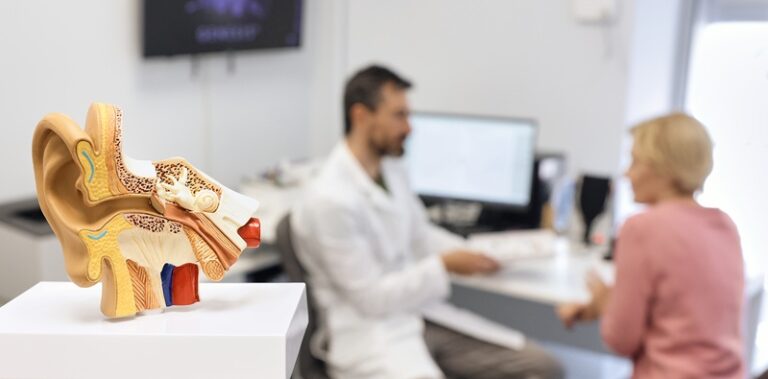Hearing loss isn’t always easy to notice, in fact, most don’t even realize their hearing is reduced until it’s too late.
Some people might think others are just mumbling, or that the TV needs to be a little louder. But in reality, these could be signs that the ears are struggling to pick up certain sounds. That’s why getting a hearing test – whether it’s a basic screening or a more advanced hearing test, is important.
But what’s the real difference between these tests? If you’ve only had a quick screening before, you might wonder why some clinics recommend advanced hearing testing instead. In this blog, we’ll walk you through the different hearing tests, why advanced ones are done, and how they help give a clearer picture of your hearing health.
Let’s get started by understanding the basics.
What Is Standard Hearing Screening?
A hearing screening is a quick check-up that shows whether you might have hearing loss. It’s often done in schools, workplaces, or even during general health exams.
During a basic screening:
- You’ll wear headphones and listen for beeping sounds (pure tones).
- You raise your hand or press a button when you hear a sound.
- The test is done in a quiet room and usually takes just a few minutes.
This kind of screening checks whether your hearing is in the normal range, but it doesn’t tell you why your hearing might be changing, or how much damage may have occurred.
In short, it’s like looking through a foggy window: you’ll see that something’s there, but not the full details.
What Makes Advanced Hearing Testing Different?
An advanced hearing test takes a deeper look at your hearing system. It doesn’t just check if you can hear, it helps understand how well you hear in different situations, and if there are any problems with your middle ear, inner ear, or hearing nerves.
These tests are more thorough and may include:
- Speech testing (to see how well you understand words)
- Tympanometry (to check middle ear movement and fluid)
- Otoacoustic Emissions (OAEs) (to test the function of your inner ear hair cells)
- Bone conduction tests (to see if hearing loss is from the ear or the nerve)
Each part of this testing helps your audiologist paint a clearer picture of your hearing. It’s a more detailed way of finding out what’s really going on.
Why Is Advanced Hearing Testing Important?
Because Every Hearing Loss Is Different
Not all hearing problems are the same. Some people struggle to hear certain pitches. Others hear sound but can’t understand speech, especially in noisy places. That’s where advanced hearing testing makes a difference.
It can:
- Detect early signs of hearing loss before it becomes noticeable
- Pinpoint whether your hearing loss is conductive (in the ear canal or middle ear) or sensorineural (in the inner ear or nerve)
- Help your hearing care provider find the right solution for you, whether that’s a hearing aid, assistive device, or medical treatment
So instead of guessing or waiting until it gets worse, you’ll get answers based on actual results.
Who Should Consider an Advanced Hearing Test?
You might think advanced tests are only for people with severe hearing loss, but that’s not always the case. These tests are helpful for:
- Adults who work in noisy environments
- People who notice they’re turning up the TV more often
- Anyone who has ringing in the ears (tinnitus)
- Those who feel like they can hear but can’t understand clearly
- People who already wear hearing aids but feel they’re not working as well
Even if you’ve had a standard test before, getting a hearing test with more advanced methods may reveal changes you didn’t know about.
What to Expect During an Advanced Hearing Test
Some patients feel nervous before hearing tests, especially if it’s their first time. But there’s nothing to worry about, it’s completely safe, painless, and doesn’t take very long.
Here’s what usually happens:
- You’ll meet with an audiologist, who will ask about your hearing history.
- You’ll be guided through a series of different hearing tests, depending on your symptoms.
- These might involve listening to speech, tones, or responding to beeps in different pitches.
- The audiologist will explain your results and work with you towards your next steps.
What should you prepare in advance for the test? Nothing. You don’t need to prepare anything special, just bring any questions you may have.
Standard vs Advanced Hearing Testing: A Quick Comparison
| Feature | Standard Screening | Advanced Hearing Test |
|---|---|---|
| Duration | 5–10 minutes | 30–60 minutes |
| Checks for | Hearing loss (yes or no) | Type, cause, and severity of hearing loss |
| Environment | Basic quiet room | Controlled test environment |
| Tests included | Pure tone screening |
|
| Outcome | Pass/Fail | Full report and personalised advice |
If a basic screening is like checking if your car starts, an advanced test is like having a proper diagnostic done by a mechanic, it gives the full picture.
Talk to a Hearing Professional Today
Getting a hearing test is a smart move, especially if it’s been a few years or if you’ve noticed any changes. Your hearing is just as important as your eyesight or dental health, you wouldn’t ignore a toothache, so you shouldn’t ignore signs of hearing changes either.
Book a consultation with our qualified audiologist who can walk you through the different hearing tests, explain what they mean, and recommend the next best step for your hearing health.
A better understanding of your hearing starts with one small step. Reach out today and hear the difference.



